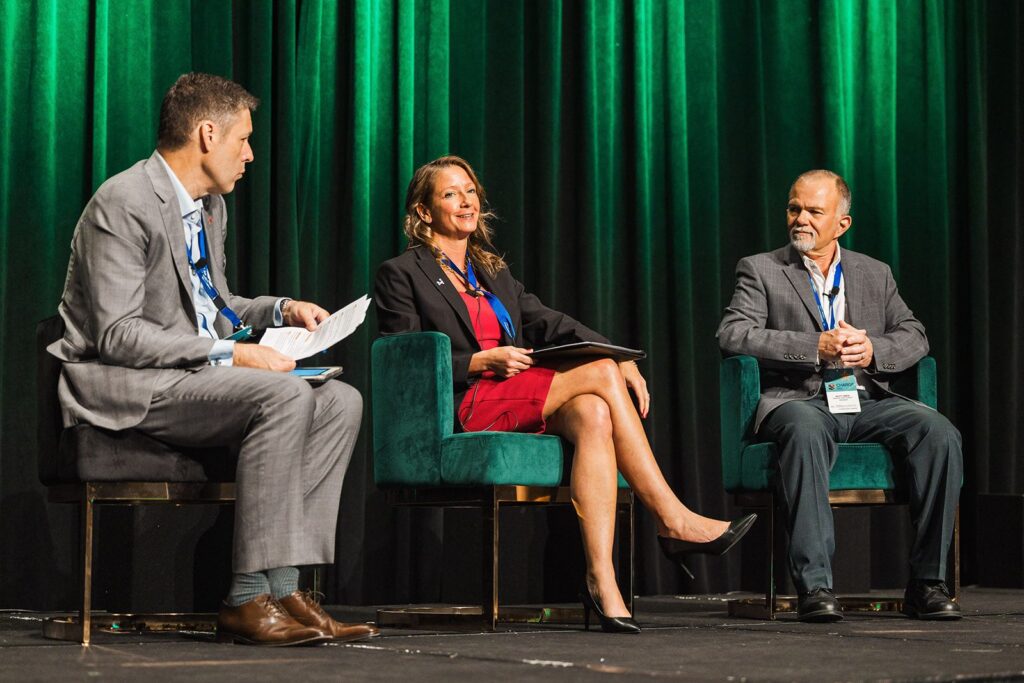
The session, moderated by Jon Wentzel, VP Communications at Nuclear Energy Institute, highlighted the experiences shared by Diane Hughes, Vice President of Marketing Communications at NuScale Power, and Scott Vance, Vice President of Corporate Governance and General Counsel at Energy Northwest.
Diane starts the session by sharing her first few weeks at NuScale and how she grew to the challenge of branding its prized product – small modular reactors which is the only technology certified and recognized by the US Nuclear regulatory authorities as fully safe.
Diane mentioned that the marketing messages of her company do not describe the technical details of the products to the customers, instead they focus on the value for human life and purpose that people can easily relate to. When posed with the challenge of marketing NuScale’s SMRs, even with her background in nuclear energy, her initial reaction was “What is a small modular reactor?”. She explained how she separated the notions of the terms ‘Technology, e.g SMR 100’ and ‘Product name’ to conceptualize a branding strategy and a winning name for the product – Voyager Power Plant. Simplicity over technology is the core of their marketing messages. It’s important to stay the course to get the message across and repeat the brand’s message over and over again once it has made its way into the minds of the customers. The storytelling has to be clear and meaningful to the customer so that they believe in the company before they are expected to believe in the product. This is particularly important for a company like NuScale that have begun their marketing campaigns without having an actual product to sell.
Prior to the “new nuclear” term, the marketing strategy of nuclear companies was focused on the technologies of tomorrow whereas now the focus is more on the product itself – clean energy. What is, therefore, important is to demonstrate the personal aspect of us all having the same goals and showing people that nuclear can help us reach those goals.
When asked about the branding and communication challenges that nuclear companies face as the industry transforms, Scott believes one of them to be making the transition to new reactors without impacting the current fleet. A challenge that they deal with in their branding and advertising is to articulate the message that existing reactors are equally as safe as new reactors, the difference between them is how their safety is achieved through systems and measures that have become redundant in new designs. Understandably, their customers are not familiar with this technology. He also highlights how important it is for Energy Northwest to be aware of their geographical location and that location’s history – an area known for the manufacturing of nuclear bombs. How they communicate to their customers that they do not represent the location’s history and differentiating Energy Northwest from nuclear bomb manufacturing is another challenge for them.
They both agree that the storytelling aspect is the key to a good marketing strategy in the nuclear industry. Only those ads with relevant humor or a deep emotion with a personal story are able to connect with the audience and remain in their memory for a long time. He suggests that all energy companies, not just nuclear energy, should understand the power of personal storytelling and use it to communicate their marketing messages. Internal branding comes into play here; having everyone on the same page is critical in the storytelling era of marketing because every employee believes in the product they are selling and that is what ticks for the customers.
Scott mentioned that in order to reach the goals for the future we cannot only rely on renewable energy sources, because they are not always readily available to us. We have to have some base load sources that are equally clean and are available all the time, not just when the wind is blowing or the sun is shining. It is our job to figure out how to make people understand this and understand the value of the product that NuScale is providing.
Scott instated that the customers, especially the next generation, are not concerned with the technical aspects of the technology, but are conscious about the impact of the technology on the environment and hence, their future. Therefore, the marketing strategy has been shaped to communicate the impact of the technology in the coming years and how it will contribute to better living individually for every person and organization and collectively for the planet. Diane added that the new nuclear technologies are not limited to generating electricity but have diverse applications like processing clean water and many more that are all equally important in our daily life. It is important to get all these messages across and NuScale puts effort in having “boots on the ground” e.g. at conferences and engaging with communities by forming partnerships with universities creating “Energy Exploration Centers”, where students get to experience their exciting new technologies. When opening up such Energy Exploration Centers in other countries she illustrated that it is all about personalizing the core message by addressing each customer in a time, tone and medium that is best suited for them to respond to the call to action. The answer, therefore, lies in a well-researched marketing communication strategy.
Join +300 C-Level executives at energy utilities, retailers, developers, power producers and e-mobility leaders at our next event in Reykjavík, October 17-18.

